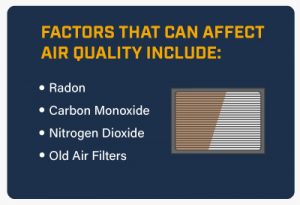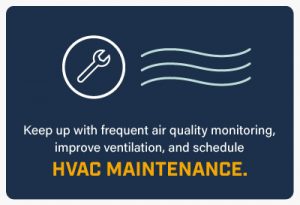How Can I Check the Air Quality in My Home?
Based on information collected by the United States Environmental Protection Agency, Americans spend 90% of their time indoors. Some research shows the average American spends 62% of their awake time at their residence. Commercial properties–like offices–often invest in top-of-the-line filtration systems, which help improve indoor air quality. However, at home, we might not think about the effects of indoor air quality (IAQ) on our lives. Poor IAQ can affect our health and contribute to pollution, so it’s essential to learn about the root causes of poor IAQ and how to keep you and your loved ones safe.
Why Residential Air Quality Testing Matters
Good indoor air quality is crucial to help prevent some serious illnesses. Pet dander, dirt, dust, molds, and other particles can infiltrate the air that we breathe in. This can exacerbate allergies and asthma and lead to health episodes. Other factors that can affect air quality include:

-
- Radon: Radioactive gas that can cause lung problems and certain cancers depending on the length of exposure.
- Carbon Monoxide: Toxic gas which causes various health issues like fatigue, confusion, chest pain, and death.
- Nitrogen Dioxide: Environmental gas produced from fuel emissions is linked to respiratory ailments.
- Old Air Filters: Clogged, dirty, and old air filters can cause pollutants and other debris to circulate throughout your home.
With the amount of time we spend in our homes, ensuring safe indoor air is paramount to health and wellbeing. Testing your home’s IAQ is your best bet to get a sense of your home’s air quality.
Indoor Air Quality Testing Options
So, how much does indoor air quality testing cost? Luckily there are several ways to check and monitor your IAQ that won’t cost you an arm and a leg. Depending on your needs, our Beaverton HVAC experts recommend the following to address your concerns:
Buy Electric Monitors: There are dozens of air quality monitors that anyone can easily purchase. These devices measure levels of radon, carbon monoxide, and other pollutants. Many have Smart capabilities so that you can receive alerts on your phone or other devices.
Cost: Prices range from $50 to $200+.
Use Radon Test Kits: The EPA recommends using test kits to check radon levels in your home. By checking with the Oregon Radon Program, you can often find kits at a discounted price. You can also purchase test kits online or at your local hardware store.
Cost: Expect to spend around $10 to $50.
Search for Signs of Mold and Mildew: Living in the Pacific Northwest means we are no strangers to the tell-tale signs of mold. Musty odors and fuzzy growth can alert us that mold and mildew are present. Since these organic fungi thrive in moist, dark areas, check your basements, drains, and crawl spaces. While a self-search is free, you will want to keep yourself safe by purchasing rubber gloves, a quality mask, and a disposable suit in case you encounter any significant mold or mildew growth.
Cost: Cost of equipment used.
Secure Professional Services: While you can do a lot of testing on your own, sometimes it’s best to call in the experts. NATE-Certified HVAC technicians can inspect your duct system for evidence of mold, perform a thorough exam of your filtration systems, and look for other potential pollutant-causing problems like faulty furnaces. Thankfully, if you are up-to-date on routine maintenance, these exams are already taking place. However, if you are concerned about poor IAQ at any time, schedule an appointment right away.
Cost: Vary based on the level of exam and treatment required.
After testing, how can you improve your IAQ and guarantee it lasts? Make sure you keep up with frequent air quality monitoring, improve ventilation, and schedule HVAC maintenance. When in doubt, work with your heating and cooling specialist to come up with a solid game plan.
Schedule an Appointment with Beaverton’s Top HVAC Experts
Beaverton’s most trusted HVAC company, AAA Heating and Cooling offers over 50 years of exceptional service. Contact us today if you have concerns about indoor air quality or want recommendations on HVAC repair or replacement.